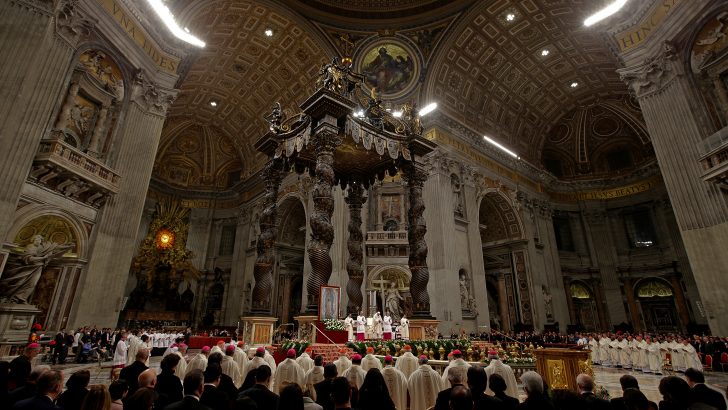Last week the Irish Catholic reported on the challenge by the former Abbot of Glenstal, Dom Mark Patrick Hedermann, to the negativity of the ACP. It also said that the Archbishop of Dublin, Dr Diarmuid Martin, was reported in the New York Times to have said that, “I could spend all my time being concerned about people who come to church, but they’re – you know I don’t want to be nasty – but they’re a dying breed.” It seemed an odd way to describe us, to say the least! I wondered, though, whether he was expressing a frustration similar to that of the ACP: that despite all their efforts the average age of priests is increasing and congregations are declining.
Today I read other words of Archbishop Diarmuid Martin, speaking at the ordination of a deacon, Tom Kouizer S.M. on 9 December this year. Talking of the missionary style of Jesus: preaching, healing and curing, he said that: “The first lesson that we have to learn regarding the missionary style of the Church today is that we have to know and understand the troubles, the sorrows, and the anxieties of the people of our times. Preaching is never just the repetition of disincarnated words, no matter how learned or eloquent. The preacher must know and identify himself with the suffering of his people.”
Knowledge
He went on to say: “Your service as a deacon, Tom, must spring from a true knowledge of Jesus and you are called to bring this personalized knowledge of Jesus to the men and women of our time. The prime thirst of contemporary humanity is the thirst for God, the God of love, as opposed to the false Gods of our or any generation.
The centrality of your life must be this Jesus whose love can overcome the limitedness and imperfection of your own self and permit you to work in your life and through you in the lives of others many signs and wonders as the Apostles did in their time.”
Speaking thus of the thirst of each soul, recognised or unrecognised, for the God of love, and of the fundamental call to bring the knowledge of Jesus to the men and women of our time, Archbishop Martin articulated in a few brief words his belief about what every priest or deacon is called to do. The media have not reported these profoundly important words as closely as they reported his other words.
I don’t actually think that we are a dying breed. Figures show that in Ireland 3.7 million people identify as Roman Catholic – 78% of the population.
Patsy McGarry, of the Irish Times, told us in May this year that, in Dublin alone, people contributed some Euro 128,000 a week to Catholic Church Share collections which provide support services in the Dublin Archdiocese to parish communities in safeguarding, education and schools, repairs to buildings, financial management, human resources, communication and training people as catechists.
All these people are supporting the Church in Dublin because they believe in it, and because they have heard about the needs in some parishes where church attendance and collections have dropped.
And the same story is replicated in dioceses across Ireland, north and south. Yes, I know that numbers are down. Yes, it is harder to convince people of the truth, and of the importance of each of them working at this gift of faith, thinking about who God is, listening to His word, and growing in faith and love.
Yet, there are those who do listen. Declan and I went on pilgrimage last month to Rome, with about 180 young people, just a small percentage of the 20,000 who have participated in the Pope John Paul 11 Award, and who were celebrating the 10th anniversary of the establishment of the Award, and their own participation in the bronze, silver and gold awards. They came from 10 dioceses. They were wonderful young people, strong and resolute in faith. They prayed and talked and sang, and yes, some of them shopped!
During the pilgrimage we spent an afternoon in the John Paul 11 lecture theatre at the Pontifical Urban University. The young people talked of their experience of the Award, of how they had been enriched; had taken an active part in the life of their Church, of their community and of society; of their growing awareness of the teaching and role of the Catholic Church in the world; of the opportunity to engage at a deeper level with Christ. One of them told us of how he realised that younger GAA players in his parish thought it was ‘cool’ not to go to church, so he started wearing his GAA shirt to Mass, encouraging them to go too, and they did. Others talked of a huge variety of experience.
These young people and so many more like them really are seeking the face of God, yet one of them asked: “Is the Catholic Church in Ireland really dying? He had heard it said. I responded, swiftly, that it will never die. It did not die through centuries of persecution, of the Penal Laws and it is strong enough to survive the march off secularism. We know this because Jesus told us ‘Be not afraid. I am with you always.”
They said they had enjoyed the experience of Rome, the sense that they really are part of the universal Church. They sought, too, something more – something to follow the John Paul 11 Award, to help them on their individual spiritual journeys as they moved on in their lives.
Being a young believer in Ireland today can be difficult. They are facing the challenges of a society which seeks even to repeal the constitutional protection of unborn children. They need support, and they need to know that we believe that the Church will not die. We owe that to them. Change is needed in the Church in Ireland. Change is what brings life.
Change
The Church has changed utterly since I was a teenager. It will continue to change. It will not die.
Derry’s Fr Paul Farren and those who developed and volunteer with the John Paul 11 Award have done a great service to all those who have participated in the Award. That in itself is a massive achievement. The challenge now is to find a way forward with which young people can continue to engage, in parishes and colleges and universities. I don’t know what that way forward will be. I am sure though that it can be done, if people within the Church give of their time and their energy and, most of all, if they continue to affirm their belief in God, and to live as if it really matters.
We need, too, a positive dialogue. The news is still good. We need to remind ourselves of the authenticity of the teaching of our Church. We cannot be complacent. We must find new ways to be Church in the world today.
We should remember the words of Newman: “God has created me to do Him some definite service…I have my mission.’ At this difficult time in the Church in Ireland, perhaps we should ask ourselves, ‘What can I do for this Church of mine which I love – in parish, in school, in community, in country? What does God want me to do?”


 Nuala O’Loan
Nuala O’Loan St Peter's Basilica, Vatican City
St Peter's Basilica, Vatican City 